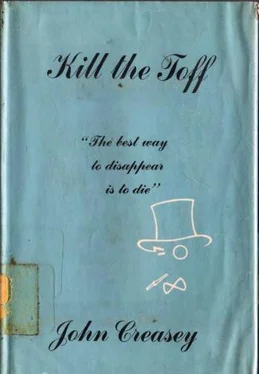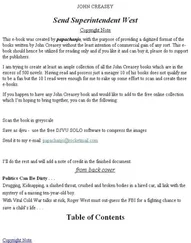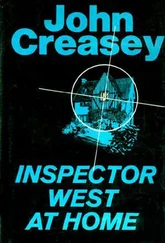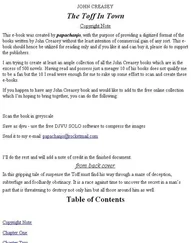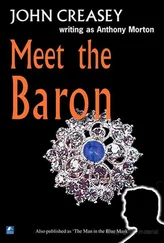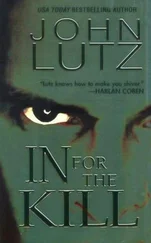John Creasey - Kill The Toff
Здесь есть возможность читать онлайн «John Creasey - Kill The Toff» весь текст электронной книги совершенно бесплатно (целиком полную версию без сокращений). В некоторых случаях можно слушать аудио, скачать через торрент в формате fb2 и присутствует краткое содержание. Жанр: Старинная литература, на русском языке. Описание произведения, (предисловие) а так же отзывы посетителей доступны на портале библиотеки ЛибКат.
- Название:Kill The Toff
- Автор:
- Жанр:
- Год:неизвестен
- ISBN:нет данных
- Рейтинг книги:5 / 5. Голосов: 1
-
Избранное:Добавить в избранное
- Отзывы:
-
Ваша оценка:
- 100
- 1
- 2
- 3
- 4
- 5
Kill The Toff: краткое содержание, описание и аннотация
Предлагаем к чтению аннотацию, описание, краткое содержание или предисловие (зависит от того, что написал сам автор книги «Kill The Toff»). Если вы не нашли необходимую информацию о книге — напишите в комментариях, мы постараемся отыскать её.
Kill The Toff — читать онлайн бесплатно полную книгу (весь текст) целиком
Ниже представлен текст книги, разбитый по страницам. Система сохранения места последней прочитанной страницы, позволяет с удобством читать онлайн бесплатно книгу «Kill The Toff», без необходимости каждый раз заново искать на чём Вы остановились. Поставьте закладку, и сможете в любой момент перейти на страницу, на которой закончили чтение.
Интервал:
Закладка:
“If I get a whisper you’ll know abaht it, Mr Ar.”
“Thanks,” said Rollison. “Now I’d better be off, there’s a lot to do.”
* * *
With the police and the voice of the East End calling the same tune about Jim Mellor, it was going to be hard going. When Rollison got into the car, the group of people watching him were puzzled and silent. He looked much as he had when he had tackled Waleski at Judith’s flat: bleak, uncompromising, aggressive, even angry. There was a rustle of comment when he drove off, for Bill Ebbutt came to the door and watched him, but Rollison didn’t glance round. So the whisper spread that there had been trouble between the Toff and Bill Ebbutt.
CHAPTER EIGHT
Neat Trick
Policemen whom Rollison passed did not salute or smile but just watched him. The change in their demeanour was so marked that he knew that word had already been spread among them, that he was to be watched and his movements reported—and that the official attitude was hostile. He drew up outside Aldgate Station, between two barrow-boys with their barrows piled up with fruit, and walked to the station entrance, making for a telephone booth. A constable saw him but took no notice until he was inside the box; then the man made a note on a pad which he took from his breast pocket.
Rollison dropped in his two pennies and dialled Doc Willerby’s number. Willerby answered himself.
“How’s the patient?” asked Rollison.
“He’ll do,” said the doctor.
“I’ve heard a lot more about him than I knew before.”
“I wondered when you’d get round to that. Changed your mind?”
“No. But if you’d rather be shot of him right away, just say the word.”
“He mustn’t be moved again to-night,” said Willerby. if the police get round to me they’ll have to take over. If they don’t—I don’t know who the man is.”
“That’s sweeter music than you know.”
“I didn’t think you’d cut much ice with Mellor in the East End; Ebbutt was your only chance. Doesn’t he feel buccaneer enough?”
Rollison laughed. “Don’t forget he’s reformed. What’s the best time to collect Mellor in the morning?”
“Before nine o’clock.”
“Right, thanks,” said Rollison. “I’ll be seeing you.”
He rang off, nodded at the constable as he stepped from the box and went more cheerfully towards his car. The interview with Ebbutt had shaken him: he had taken Ebbutt’s aid for granted. He was dissatisfied with himself. He had heard of the trouble in the Dimond gang but not the name of the new leader. He had traced Mellor through his Army record and his foster-parents and had only made cursory inquiries into his post-war record. He knew that Mellor had his own small flat, played a lot of tennis and was a go-ahead manager of a small printing firm in the North-West of London.
The new information couldn’t be ignored, though the Mellor he had traced seemed to be a completely different man from the Mellor Ebbutt knew. Had he stumbled upon a new Jekyll and Hyde?
When he turned into Gresham Terrace a heavily-built man was opposite Number 22g where he had his flat; the man was from the Yard although Rollison couldn’t recall his name. Rollison nodded and received a blank stare in return. He let himself into the house and then went back to the pavement to survey the street and find out whether there was another Yard man about. He didn’t see one.
Gresham Terrace, near Piccadilly, was a wide road with stately terraced houses on either side—a sharp contrast to the mean streets from which he had just come. The house was near a corner. Three shallow stone steps led up to a small porch. The entrance hall was long and narrow and carpeted from wall to wall. The first flight of stairs was also carpeted—the higher flights were of bare stone. He walked up thoughtfully and, when he reached the top landing which served only his flat, the door opened and Jolly appeared.
“Good evening, sir.”
“Hallo, Jolly. Everyone here?”
“Yes, sir, if you mean Miss Lome and Mr Higginbottom.”
“I do.”
Rollison passed into the square hall, off which led all five rooms of the flat. Immediately opposite the landing was the living-room and he heard voices as that door opened and Snub beamed at him.
“All in one piece?”
“So far.”
“I say, you look a bit grimmish about the gills,” said Snub.
“Just thoughtful,” said Rollison. “Something to drink, Jolly.”
He went into the room and saw Judith standing by an armchair near the window.
He was struck by her pale face and troubled eyes and wondered just how much she knew about Mellor’s reputation, whether he had been wrong in his first good opinion of her. She wore a black two-piece suit with a plain white blouse; it would serve as mourning. When he smiled at her she raised her hands, as if to ward off an impending blow. Immediately he was angry with himself, for he had forgotten the anxiety which she must be feeling. Snub must have told her something of the truth.
“Is he—” she began but couldn’t go on.
“He’ll pull through,” said Rollison.
She caught her breath. “Are you sure?”
“I’m quite sure; I’ve just telephoned the doctor.”
“Oh,” she said.
She put her hands behind her, groping for the chair, and Snub slipped quickly across the room and helped her to sit down. She leaned back, her eyes closed, and Rollison knew that she was fighting against tears. He knew more than that: she believed in Mellor and she had told the truth as she knew it. He did not doubt that again throughout the case.
“Whisky for the lady,” Snub said and came close to Rollison. “Her nerves have been stretched as tight as a drum. You haven’t just tried to cheer her up, have you?”
“No, Mellor will pull through.”
“Fine! A very lucky young man, in my opinion,” said Snub. “How’s everything?”
“Bad.” Rollison took a whisky-and-soda from the tray which Jolly held in front of him, Snub took another and carried it to the girl. “I want you a minute,” Rollison added and went with Jolly into the kitchen.
It was small, spotless, white-tiled; the pans shone, everything was in its appointed place.
Jolly closed the door.
“I hope there has been no trouble, sir.”
“We’re in a jam but we’ll get out of it,” Rollison said. “Nothing really serious. How did you get on with the police? Did they learn anything about Asham Street?”
“Not from us, sir.”
“Good! Were they difficult?”
“Insistent but I think they believed all that we told them.”
“They won’t in future. Grice is on the warpath and there is a general feeling that Mellor is a real bad hat. What’s all this about Waleski?”
Jolly said solemnly: it was really somewhat ridiculous, sir. The man was still in the kitchen when the police arrived and he offered no violence. He accused you of assaulting him and even preferred a charge. I made no comment, thinking you would best be able to deal with the situation. The police took the gun which was found in the flat— his gun, I believe. Miss Lome told them about the man who had attacked her and also about the note which she received. There was some annoyance displayed when the note could not be found.”
Rollison laughed. “They can have it; run it over for prints first, Jolly, and see whether we’ve anything in our private collection. Then ring Grice up and apologise because I absent-mindedly slipped it into my pocket.”
“Very good, sir.”
“And test this other note for prints, too.” Rollison pulled out of his pocket the letter he had picked up in Mellor’s room. “But don’t let the police have that. It’s Exhibit A for the private collection. Very likely you’ll find no prints except Mellor’s and mine. If there are any others, they’ll probably be the same on each.”
Читать дальшеИнтервал:
Закладка:
Похожие книги на «Kill The Toff»
Представляем Вашему вниманию похожие книги на «Kill The Toff» списком для выбора. Мы отобрали схожую по названию и смыслу литературу в надежде предоставить читателям больше вариантов отыскать новые, интересные, ещё непрочитанные произведения.
Обсуждение, отзывы о книге «Kill The Toff» и просто собственные мнения читателей. Оставьте ваши комментарии, напишите, что Вы думаете о произведении, его смысле или главных героях. Укажите что конкретно понравилось, а что нет, и почему Вы так считаете.
